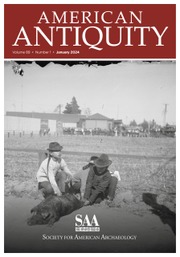Article contents
A Conflict of Values in American Archaeology
Published online by Cambridge University Press: 20 January 2017
Abstract
As contract salvage programs have come to support more and more archaeological fieldwork and analysis, and as archaeologists have become increasingly concerned with the relevance of their sub-discipline to the larger explanatory goals of anthropology, a strategic conflict has arisen that threatens to severely limit the potential of American archaeology for long-range explanatory research. It is contended that this conflict has arisen because salvage-support agencies have been led to organize their contract procedures along lines amenable to inductive, laissez-faire research. These procedures have become canonized while archaeology has begun to drift toward deductive, interdisciplinary team methods. Proposed salvage programs in the North Coast Ranges of California are used to illustrate the self-defeating nature of present procedures, and reorganization is suggested to permit increased theoretical input and the integration of salvage operations into large-scale regional research programs.
- Type
- Articles
- Information
- Copyright
- Copyright © Society for American Archaeology 1971
References
- 16
- Cited by




